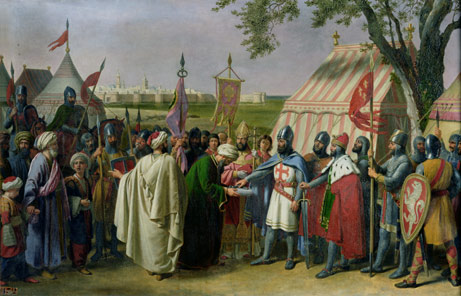There is always two sides of the story.
“the Crusades were a reaction against over three hundred years of jihad when the Eastern Christians were persecuted, and hundreds of churches destroyed.”
The Mythistory of the Crusades
by Ibn Warraq (October 2013)
A new generation of Western scholars of the Middle Ages have been trying to put right the misconceptions that have grown up about the Crusades. As Jonathan Riley-Smith has argued “modern Western public opinion, Arab nationalism, and Pan-Islamism all share perceptions of crusading that have more to do with nineteenth-century European imperialism than with actuality.”1 Muslims in particular have developed “mythistories” concerning the putative injuries they have received at the hands of the Crusaders. The first point that needs to be emphasized is that the Crusades were proclaimed not only against Muslims, but also against many groups, and communities that the Catholic Church considered heretical, and enemies of the faith, groups such as the pagan Wends, Balts and Lithuanians, shamanist Mongols, Orthodox Russians and Greeks, Cathar and Hussite heretics.2
Second, the Crusaders were not extremists or barbarians indulging in thoughtless violence, rather the underlying rationale of the Crusades was relatively sophisticated, elaborated theologically by Christian nations that were threatened by Muslim invaders who had managed to reach into the heart of Europe, in central France in the eighth century. The Crusades were a response to the desecration of the Christian shrines in the Holy Land, the destruction of churches, and the general persecution of Christians in the Near East. A Crusade to be considered legitimate had to fulfill strict criteria; one did not enter into it lightly for self aggrandizement. There had to be a legally sound reason. It was, in other words, waged for purposes of repelling violence or injury and the imposition of justice on wrongdoers. A Crusade was never a war of conversion, rather a rightful attempt to recover Christian territory which had been injuriously seized in the past. Only a recognized authority could formally declare a Crusade, and it had to be waged justly.3
The Crusaders were not colonialists, and the Crusades were not engaged in for economic reasons, as many Western Liberals and Liberal economists assumed; most crusaders would have laughed at the prospect of material gain. In fact, crusading became a financial burden as the expenses associated with warfare increased. They were far more concerned with saving not only Christendom from Islam, but also their souls. The role of penance has often been overlooked in crusading thought and practice; many crusaders believed that by taking part in a crusade they were able to repay the debt their sinfulness had incurred.
Nineteenth, and even early twentieth century Europeans unashamedly used crusader rhetoric and a tendentious reading of crusader history to justify their imperial dreams of conquest. For example, after the First World War, the French Mandate in Syria led to a considerable French historical literature, “one theme of which was that the achievements of the crusaders provided the first chapter in a history that had culminated in modern imperialism.”4 As we shall see, the newly emerging Arab nationalists took nineteenth-century rhetoric seriously. A second strand in false, modern interpretations of crusader history was furnished by European romanticism, as for example, manifested in the novels of Sir Walter Scott.- the main subject of my book. As Riley-Smith summarized, “The novels [of Scott] painted a picture of crusaders who were brave and glamorous, but also vainglorious, avaricious, childish and boorish. Few of them were genuinely moved by religion or the crusade ideal; most had taken the cross out of pride, greed, or ambition. The worst of them were the brothers of the military orders, who may have been courageous and disciplined but were also arrogant, privileged, corrupt, voluptuous and unprincipled. An additional theme, the cultural superiority of the Muslims, which was only hinted at in the other novels, pervaded the The Talisman [1825].”5
In a recent (December, 2008) television programme, Boris Johnson, the Mayor of London, presented a rather biased programme on the Crusades, but biased against the Christians, laying the blame of the Crusades entirely on the Christians, who are always depicted as barbarians. He pointed out at that Christians in Spain after the expulsions of the Moors converted a mosque into a church, and called this act “vandalism.” However, he failed to point out that the Crusades were a reaction against over three hundred years of jihad when the Eastern Christians were persecuted, and hundreds of churches destroyed. He also failed to mention the conversion of the magnificent Byzantine Hagia Sophia into a mosque, (though admittedly this took place after the Fall of Constantinople in 1453—it was a mosque from 29 May 1453 until 1931. But my point is that Islamic jihad did not end with the defeat of the Crusaders. On the contrary, in Islamic doctrine all the later Islamic conquests were seen as a part of the religious duty of carrying out jihad until the entire the world submits to Islam).

